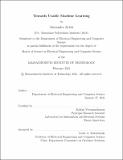| dc.contributor.advisor | Kalyan Veeramachaneni. | en_US |
| dc.contributor.author | Zytek, Alexandra(Alexandra Katrima) | en_US |
| dc.contributor.other | Massachusetts Institute of Technology. Department of Electrical Engineering and Computer Science. | en_US |
| dc.date.accessioned | 2021-05-24T20:24:10Z | |
| dc.date.available | 2021-05-24T20:24:10Z | |
| dc.date.copyright | 2021 | en_US |
| dc.date.issued | 2021 | en_US |
| dc.identifier.uri | https://hdl.handle.net/1721.1/130797 | |
| dc.description | Thesis: S.M., Massachusetts Institute of Technology, Department of Electrical Engineering and Computer Science, February, 2021 | en_US |
| dc.description | Cataloged from the official PDF version of thesis. | en_US |
| dc.description | Includes bibliographical references (pages 71-74). | en_US |
| dc.description.abstract | Machine learning (ML) is being applied to a diverse and ever-growing set of domains. In many cases, domain experts--who often have no expertise in ML or data science-- are asked to use ML predictions to make high-stakes decisions. Multiple ML usability challenges can appear as result, such as lack of user trust in the model, inability to reconcile human-ML disagreement, and ethical concerns about oversimplification of complex problems to a single algorithm output. In this thesis, we investigate the ML usability challenges present in non-technical, high-stakes domains, through a case study in the domain of child welfare screening. This study was conducted through a series of collaborations with child welfare screeners, which included field observations, interviews, and a formal user study. Through these collaborations, we identified four key ML usability challenges, and honed in on one promising ML augmentation tool to address them (local factor contributions). This thesis also includes list of design considerations to be taken into account when developing future augmentation tools for child welfare screeners and similar domain experts. Finally, we address the remaining challenges facing the ML community when making ML models more usable in diverse domains. | en_US |
| dc.description.statementofresponsibility | by Alexandra Zytek. | en_US |
| dc.format.extent | 77 pages | en_US |
| dc.language.iso | eng | en_US |
| dc.publisher | Massachusetts Institute of Technology | en_US |
| dc.rights | MIT theses may be protected by copyright. Please reuse MIT thesis content according to the MIT Libraries Permissions Policy, which is available through the URL provided. | en_US |
| dc.rights.uri | http://dspace.mit.edu/handle/1721.1/7582 | en_US |
| dc.subject | Electrical Engineering and Computer Science. | en_US |
| dc.title | Towards usable machine learning | en_US |
| dc.type | Thesis | en_US |
| dc.description.degree | S.M. | en_US |
| dc.contributor.department | Massachusetts Institute of Technology. Department of Electrical Engineering and Computer Science | en_US |
| dc.identifier.oclc | 1252064714 | en_US |
| dc.description.collection | S.M. Massachusetts Institute of Technology, Department of Electrical Engineering and Computer Science | en_US |
| dspace.imported | 2021-05-24T20:24:10Z | en_US |
| mit.thesis.degree | Master | en_US |
| mit.thesis.department | EECS | en_US |
